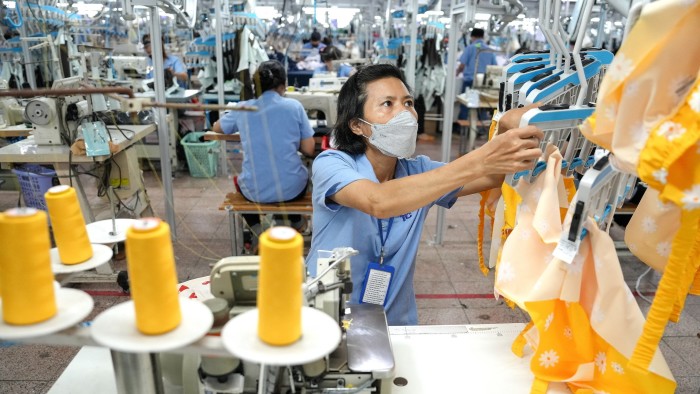Unlock the White House Watch newsletter for free
Your guide to what the 2024 US election means for Washington and the world
For years, Vietnam and several south-east Asian neighbours seemed to have a winning growth formula. They followed the export-led path already trodden by the likes of China. They were big beneficiaries of the reordering of supply chains prompted by Covid and US tensions with Beijing, becoming part of “China plus one” strategies for US and other businesses seeking a second export manufacturing base. Now those policies have come back to bite them. When Donald Trump unveiled his “liberation day” tariffs, some of the highest were the 46 per cent rate on Vietnam, and 49 per cent on Cambodia.
Though a big rise in US tariffs on China was expected, the hit to south-east Asian manufacturing was a surprise. Writing in the Financial Times, Peter Navarro, Trump’s trade adviser, made clear the White House wants to make countries such as Cambodia and Vietnam choose between the US and China, and “stop allowing China to evade US tariffs by trans-shipping exports through your countries”. Some Trump administration insiders insist China is their main target; other countries affected are collateral damage.
The damage, though, is substantial — and far from one-sided. Major US companies including Apple, Nike and Intel have manufacturing or suppliers in Vietnam, following a strategy they believed made sound business and political sense. While efforts to improve domestic capabilities in some high-end manufacturing may have merit for supply chain resilience, moreover, the economics of reshoring T-shirt making to the US is questionable.
China has opted for retaliation, vowing to “fight to the end” if Washington presses ahead with punitive levies. It probably felt bound to take a stand against the bullying by its biggest single trading partner — and has more scope to hurt the US than smaller Asian counterparts. South-east Asian countries have so far chosen negotiation over confrontation, trying to keep exports flowing as far as they can. That makes sense. Since their comparative advantage still lies overwhelmingly in low labour costs, changing their economic model is hardly realistic.
Malaysia’s Prime Minister Anwar Ibrahim is aiming to co-ordinate the response of Asean, and a delegation from the south-east Asian trading bloc travelled to Washington on Tuesday. Anwar’s efforts may be hindered by the group’s economic diversity: Indonesia, for instance, exports more commodities to the US; the Philippines has a current account deficit and exports more services. Some members have already made their own overtures to Washington. Vietnam has offered to remove all tariffs on US imports, earning warm words from the US president.
But Navarro and other US officials have accused Vietnam and others of “cheating” via non-tariff barriers such as export subsidies, as well as being platforms for Chinese exports to evade tariffs. That may limit any chance of negotiated deals. So Asean countries must also try to further deepen inter-regional trade, as they have through their Regional Comprehensive Economic Partnership with China, Japan, South Korea, Australia and New Zealand, and the Asia-Pacific CPTPP pact. They should also seek to improve free trade ties with the EU and western markets.
Yet in the end, despite their deep US trade links, it is very hard for, say, Cambodia or Vietnam to plump for America over China, the economic giant on their doorstep; much of the recent growth in Vietnamese manufacturing exports comes from Chinese companies relocating operations to Vietnam. If Trump’s White House pushes them too hard to choose, without making concessions, it may drive them deeper into the arms of the very country at which it says its hardline trade policy is mainly targeted.
Read the full article here




